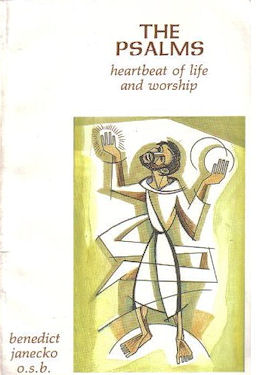
|
Posted September 24, 2012
Book: The Psalms: Heartbeat of Life and Worship Author: Brother Benedict Janecko, O.S.B. Archabbey Publications. 300 Fraser Purchase Rd. Latrobe, PA. 2007. pp. 96 An Excerpt from the Jacket:
This book points believers to this ageless prayer book of life. Examining the major themes of the Psalms, the author tries to rescue the impassioned cry of the psalmist from superficial piety and disuse, Brother Benedict Janecko, O.S.B. shows that one finds the heart of religious experience in ordinary living, whether we are "on a high," "in the pits," or somewhere in between. The reader of this small book will recognize his or her own struggle to trust, to forgive, to repent, to wonder, to endure, to cope, to find meaning, to get along, to express oneself --- and in doing so, will know the truest religious experience: God living and reigning within one's own life. An Excerpt from the Book: Happy those who do not follow The counsel of the wicked, Nor go the way of sinners, Nor sit in the company with scoffers, Rather, the law of the LORD is their joy; God's law they study day and night. They are like a tree planted near streams of water, that yields its fruit in season; Its leaves never wither; Whatever they do prospers. Biblical beginnings are often sprinkled with original blessings, with beatitudes, with happiness. Examples are the Adam and Eve story (Gn 1-2), Noah after the flood, Abram and Sarai, Jacob and his descendant Joseph, and Job. The psalter is no exception. It, too, commences with a beatitude, a blessing, a happy note. This song contrasts the just or righteous person with the wicked one. Reminding us that we are a choosing people as well as a chosen people, it invites us to make a choice. Life and death are daily before us; we must choose. Destiny is in our own hands as well as in the hands of God. We are the co-creators and co-determiners of our lot and of our life. In verse one the key to happiness is presented first in a negative fashion: the just person avoids evil company. Verse two takes a more positive posture: the just person delights in the law of the Lord, meditating on his law day and night. The "law" here has no legalistic tone. It encompasses much richer meanings such as Torah, instruction, revelation, Scripture story, God's word and will for humankind. It is sound advice --- a guide and norm for choosing life. It teaches us how to sit, stand, and walk in the way of the Lord. The law is a light to guide us so that we do not stumble or fall. The just person meditates on this law day and night. In chapter three of John's Gospel, one commentator indentifies Nicodemus, a Jewish leader who went to see Jesus at night, as a just man. Usually people did not make nightly visits to another's house. This suggests Nicodemus might have stayed awake all night, meditating on the law. Table of Contents: An invitation to praise God An invitation to choose Awe and wonder, the Lord of the storm God acts in history The trusted creature Laments, the pits Repentant creature, forgiving creator Abandoned creature Creature capable of hatred and vengeance Creatures as God searcher Creature as wayfarer Liturgical creatures Worshiping creatures, enthronement Royal psalms, theology fit for a king Creatures of praise Doxology Suggested Readings |
|
